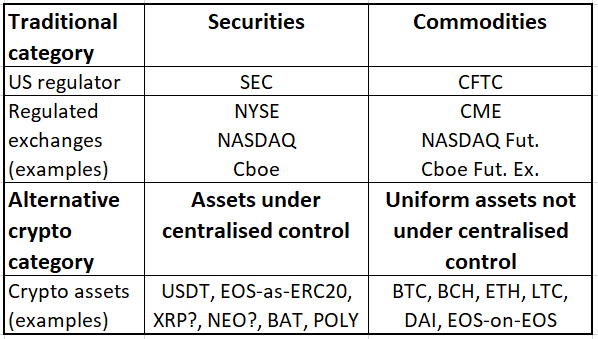Classifying and Regulating Crypto-Assets
Out with Howey
Disclaimer: This is not investment advice. Please do your own research before investing into crypto-assets and always seek professional advice before making any investment.
Crypto-securities and crypto-commodities
Last week the SEC stated that exchanges which trade crypto-assets meeting the definition of a security must register with the SEC. The CFTC may follow suit and require crypto-commodities to be traded only on platforms registered with the CFTC. Classifications of crypto assets are hotly debated but a US district judge recently ruled that virtual currencies like bitcoin can be regulated as commodities by the CFTC.Utility tokens
If the SEC governs the trading of crypto-securities and the CFTC governs the trading of crypto-commodities, who rules utility tokens? Many, if not most, ICOs have in the last 2 years positioned their coin as a “utility token” with the objective to fail the Howey-test and thereby escaping securities regulation. The SEC however seems to step away from the narrow Howey-test interpretation and released a statement last December that “Merely calling a token a ‘utility token’ or structuring it to provide some utility does not prevent the token from being a security.”Cyber Capital believes that any token which is liquid and which is centrally controlled is ripe for high risk speculation and should therefore receive the same level of consumer protection and individual scrutiny that securities get.
Centrally controlled application layer coins, including utility coins, are often high risk. For example the prices for services and the amount being burned upon each transaction can change without the consent of stakeholders. A proper advance disclosure, potentially through a predefined SEC form, may have to be enforced in instances where the coin economics change.
Such regulations should also be considered in case of crypto-currencies and other protocol level coins which are not fully decentralized even though they may be marketed as such. The CFTC would not want to supervise a security disguised as a commodity. Therefore the SEC and CFTC will have to jointly agree on edge cases such as NEO and XRP, should they want to list on a US exchange. The organisations behind these coins may effectively be in control of the protocol consensus. These firms may need to file annual reports (Form 10-K), report on beneficial owners of more than 5 percent (Form 13) and perform in general the same or similar disclosures as required for traditional securities.

Traditional regulators reimagined
Tokenized assets and stable coinsFor stable coins like Tether and MakerDAO it makes sense that Tether, by virtue of its centralised nature, is under individual, SEC style, scrutiny and the decentralised DAI stable coin escapes individual scrutiny as a commodity regulated by the CFTC.
Smart contracts and DAOs
What about smart contracts (e.g. MKR) and Decentralised Autonomous Organisations (“DAOs”)? They are not commodities as they are far from uniform but they are also by their nature fully decentralised, i.e. SEC has no-one to hold responsible . Nevertheless the SEC decided last July that DAOs were indeed securities as they require “all the proper disclosures and are subject to regulatory scrutiny for investors’ protection.” Smart contracts have the same issue. As no legal entity will vouch for them, registered exchanges will have to stay away from them. Finding a solution to this category is challenging, but a progressive line of thinking emerged in Malta recently whereby “Technology arrangements” such as smart contracts and DAOs can get a legal personality by themselves.Timelines
We’d expect the regulators of the G20 to come with official statements on regulating crypto-assets after their meeting on 19–20 March in Argentina.Preliminary conclusions
Regulating centrally controlled crypto-assets in a similar way traditional securities and commodities are regulated would be prudent.Truly decentralised crypto-assets which are commodities, such as bitcoin, seem to have little to fear of the new restrictions on crypto exchanges.
It remains to be seen if exchanges can be regulated by the SEC and CFTC simultaneously so you can actually continue to buy crypto-securities with BTC or another crypto-commodity.
Blockchain startups will have to revert to more traditional sources of funding such as angel investors, venture capital and pre-sales (SAFTs).
Cyber Capital research: Alex Fauvel, Fundamental Analyst and Jan Smit, Portfolio Manager. Cyber Capital is a crypto-asset investment fund based in The Netherlands. The fund portfolio is actively managed and contains up to a 100 different crypto-assets.
See original source
SEC just want their cut, they had a crackdown on the exchanges which were running from so many years. Why are these things looked into now when they have millions in revenues and not when these things just got started.
Downvoting a post can decrease pending rewards and make it less visible. Common reasons:
Submit
Well that is a good point ... it is all just very slow ...
Downvoting a post can decrease pending rewards and make it less visible. Common reasons:
Submit
Just an fyi to save other uninformed readers like me from having to google it, the CFTC is the Commodity Futures Trading Commission, which is the U.S. agency that regulates options markets and trading on futures contracts.
Lots of good info here that's explained well, thanks!
Downvoting a post can decrease pending rewards and make it less visible. Common reasons:
Submit